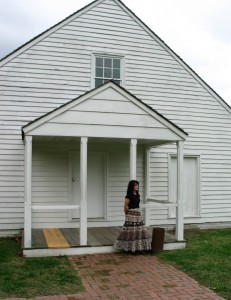Around the time Paris Hilton made accessorizing with a Chihuahua “hot,” Angelina Jolie made it hip to wear an exotic, adopted, ankle biter on her scrawny hip. Jolie’s couture kids are fully color-coordinated. The actress “has six children, three of whom were from international adoptions.”
Tabloids report that Brangelina’s Benetton Brood is precocious and freaky, as you’d expect. (Tabloids, by the way, did the only hard news reporting during the OJ Simpson travesty of a trial. Ditto in the John Edwards’ love child scandal.)
But there’s one thing the spoilt-rotten Brangelina bunch can’t have. Pop Eater tells us that the ill-bred brood will be brooding on Thanksgiving, because mommy dearest is against the feast.
“Angelina Jolie hates this holiday and wants no part in rewriting history like so many other Americans,” a friend of the actress tells me. “To celebrate what the white settlers did to the native Indians, the domination of one culture over another, just isn’t her style. She definitely doesn’t want to teach her multi-cultural family how to celebrate a story of murder.” … “Angelina gets so grossed out by Thanksgiving that she has made sure her family will not be in America this year on Thursday,” an insider tells me.
Perhaps this deeply silly woman should read John Stossel’s always simple, straightforward columns. In “Happy Starvation Day” this week, Stossel explains “the lost lesson of Thanksgiving”:
The Pilgrims at Plymouth Colony organized their farm economy along communal lines. The goal was to share the work and produce equally.
That’s why they nearly all starved.
When people can get the same return with less effort, most people make less effort. Plymouth settlers faked illness rather than working the common property. Some even stole, despite their Puritan convictions. Total production was too meager to support the population, and famine resulted. This went on for two years.
This entertaining and historical story shows that the actual hero of the Thanksgiving was neither white nor Indian: “Squint and the Miracle of Thanksgiving”
“So as it well appeared that famine must still ensue the next year also, if not some way prevented,” wrote Gov. William Bradford in his diary. The colonists, he said, “began to think how they might raise as much corn as they could, and obtain a better crop than they had done, that they might not still thus languish in misery. At length after much debate of things, (I) (with the advice of the chiefest among them) gave way that they should set corn every man for his own particular, and in that regard trust to themselves. And so assigned to every family a parcel of land.”
In other words, the people of Plymouth moved from socialism to private farming. The results were dramatic.
“This had very good success,” Bradford wrote, “for it made all hands very industrious, so as much more corn was planted than otherwise would have been. By this time harvest was come, and instead of famine, now God gave them plenty, and the face of things was changed, to the rejoicing of the hearts of many.”
Because of the change, the first Thanksgiving could be held in November 1623. …
UPDATE I (Nov. 25): A joyous Thanksgiving to all (besides the enemies of liberty who are everywhere around us).
UPDATE II: “BAD EAGLE HAS SPOKEN.” Somehow I doubt that joyless Jolie, of the giant wagging finger, would appreciate the words of Bad Eagle on this Thanksgiving day:
“… BadEagle.com thanks all American Indians for their faithfulness, for their strength, and for their patriotism. We are exceedingly proud of the fact that Indians are exemplary in America, and humbly happy that American Indians set this example before the greatest nation on earth. We are still here. Our presence reminds America of what it means to be a nation, to love a nation, and to preserve a nation–precisely what America needs to know now. America’s Stygian state, its mindless drift on the river of Lethe, and its apparent fascination with deception and corruption, all spell disaster soon-coming. BadEagle.com is profoundly thankful to American Indians for providing a ready lesson in the costs of nationhood.”
UPDATE III (Nov. 26): BAD EAGLE HAS SPOKEN … WITH A VENGEANCE. Dr. David Yeagley, aka Bad Eagle, is an original and independent thinker. Perhaps this is why you don’t see more of him on Fox News.
“Injustices have abounded against Indians,” I told him in an interesting interview he conducted with me, one in a series of interviews with leading conservative and independent writers. Justifying the decimation of the Indian nations is akin to the convoluted attempts, on this blog as well, to whitewash killing civilians at Hiroshima and Nagasaki.
In my yet-to-be published book, Into the Cannibal’s Pot, I draw similar distinctions to David’s (hereunder in the Comments Section) with respect to the willful destruction by the British of the Zulu nation. Nothing the much-maligned Boers have ever done remotely resembles the massacres and mass murders committed by the “Anglo-American axis of Evil,” a chapter so titled in Into the Cannibal’s Pot. Ditto the Indians. Nothing the Amerindians have ever done within their self-governing territories—including to wage merciless and murderous internecine warfare on neighboring tribes—has come close to the ethnic annihilation visited upon them by the American, and other colonial, states.
American settlers defended themselves against hostile Indians as was their right (the parallels to the Boers at the Battle of Blood River are obvious). What successive American governments and military did to the Indians—these are crimes against humanity as only the state could commit.
These are the facts, nothing more.
While David is drawing distinctions between myself (a classical liberal) and other conservatives, here’s another shocker. I made friends with two exceptional men at WND’s annual conference: Albert Thompson and Erik Rush. Both were taken aback when I expressed this view on reparations: Where title to land stolen during the era of slavery can be traced, I would support reparations. The logistics, naturally, are difficult. But the principle is not. What was stolen, must be returned. Of course, the nation’s race hucksters have turned a debate about individual property rights into one sanctioning collective guilt and state-directed shakedowns.
Bad Eagle’s blog carries an interesting thread.
UPDATE IV: We discussed the crimes against Japanese civilians on the Barely A Blog post titled “White Light, Black Rain: The Destruction Of Hiroshima And Nagasaki.” Unfortunately, the comments were lost, but my replies to them in the form of updates remain, as do the hyperlinks. Forgive me for not reposting the same comments in favor of the mass murder of innocents. However disdainful, on the anniversary of that crime, I may open up this forum so as to relitigate these crimes.
UPDATE V (Nov. 27): The Rousseauist reverence for the Noble Savage I’ve condemned many times. For example:
“Robert Hughes writes: ‘Historical evidence shows that the people of the Americas had been doing very nicely for centuries and probably millennia when it came to murder, torture, materialism, genocide, enslavement and sexist hegemony.’ In our silly view of native Americans we have, says Hughes, perpetrated a stereotype in which European man has become the demon, and the native has been canonized.”
And this from “Rousseau’s Noble Savage – Not on this Continent”:
In light of archeological findings, the myth of the purity of primitive life juxtaposed to the savagery of Western Culture is even less justified. The Americas are scattered with archeological evidence of routine massacres, cannibalism, dismemberment, slavery, abuse of women and human sacrifice among native tribes. Why, the Northwest Territories Yellowknife tribe eventually disappeared as a direct result of a massacre carried out as late as 1823. By the same shift of logic, should remaining native “nations” perhaps not be made to pay reparations among themselves?
BUT the same essay ends thus:
“In no way do these facts mitigate or excuse the cruel treatment natives have endured. All they do is cut through the ‘rhetoric of moral superiority’ and challenge the cultural script.”




